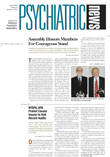Back in 1951 a certain strain of lab mouse was discovered that acted, well, drunk. Even if these little “reeler” mice, as they were dubbed, had had human intelligence, they could not have foreseen what a splash they would make in the psychiatric research world half a century later.
The gene (or rather absence of gene) responsible for the mice’s reeling was identified in 1995. Then the protein made by this gene was identified. And now the reelin protein seems to be present in abnormally low amounts in the brains of persons who have autism, bipolar disorder, major depression, or schizophrenia.
For example, S. Hossein Fatemi, M.D., an associate professor of psychiatry, cell biology, and anatomy at the University of Minnesota, and coworkers have found 43 percent less reelin protein in the cerebella of deceased autism patients than in the cerebella of deceased, psychologically healthy individuals. They have also discovered that individuals with bipolar disorder, major depression, or schizophrenia have less reelin protein in their hippocampi than do individuals who are psychologically healthy. John Davis, M.D., a psychiatric scientist with the University of Illinois at Chicago, and colleagues have found a 30 percent to 50 percent reduction of the reelin protein in the brains of deceased bipolar and schizophrenia patients compared with the amount in the brains of deceased, psychologically healthy individuals. What’s more, two researchers at Oxford University in England—Sharon Eastwood, Ph.D., and Paul Harrison, M.D., Ph.D.—have essentially replicated Davis and team’s schizophrenia-reelin findings. They published their results in the September Molecular Psychiatry.
Implications Far Reaching
Such findings, of course, raise some provocative questions.
First, if a person inherited a particular version of the reelin gene that led to insufficient production of the reelin protein in the brain, could that reelin insufficiency help set the stage for autism, bipolar disorder, depression, or schizophrenia? Very likely, some evidence suggests. For instance, two scientists working at the University Campus Bio-Medico in Rome—Flavio Keller, M.D., chief of the Laboratory of Developmental Neuroscience and Neural Plasticity, and Antonio Persico, M.D., chief of the Laboratory of Molecular Psychiatry and Neurogenetics—studied children with autism, as well as their parents, to see whether they might be able to find a link between the possession of a particular gene variant and autism susceptibility. They discovered a link between autism vulnerability and possession of a particular version of the reelin gene. This finding also indicated that the reelin gene in humans is located on chromosome 7.
Second, if a person inherited a particular variant of the reelin gene that in turn led to inadequate manufacture of the reelin protein in the brain, how might this inadequate production help lay the foundation for autism, bipolar disorder, depression, or schizophrenia?
One possible answer may have been found by Gabriella D’Arcangelo, Ph.D., the principal discoverer of the reelin gene. Back in 1995 D’Arcangelo was a post-doctoral scientist with Tom Curran at the Institute of Molecular Biology in Nutley, N.J. About the time that she and her colleagues identified the reelin gene, they also discovered that the reelin protein is made in the brain during the earliest phases of brain development and that it serves as a stop sign for newborn neurons so that they end up in their proper places in the brain. Thus, it is quite conceivable that if a particular version of the reelin gene were inherited that led to insufficient reelin protein production in the brain, that sparse production in turn might allow newly developed neurons to end up in the wrong places in the brain. The resulting neuronal disarray, then, might allow for the development of autism, bipolar disorder, depression, or schizophrenia.
Therapeutic Scenarios Anticipated
Finally, might all of these discoveries coupling the reelin gene and the reelin protein with autism, bipolar disorder, depression, and schizophrenia be used to help persons with those mental illnesses? Certainly not immediately, but perhaps eventually.
For example, as Keller told Psychiatric News, “It appears that down-regulation of reelin leads to alterations in dopaminergic and GABAergic signaling pathways. There may also be an important link between reelin and cholinergic neurotransmission. These findings are interesting because all these neurotransmitter systems have been implicated in autism (and other psychiatric disorders of neurodevelopmental origin) and can be targeted by existing (or still to be developed) drugs. . . .[Also] if a decrease in reelin expression/function is indeed a risk factor for autism or other neurodevelopmental conditions, one would think that increasing reelin levels and/or function may ameliorate the disease. Theoretically, this could be obtained either by selectively turning on reelin gene expression (which is technically very difficult) or perhaps more simply by increasing reelin protein levels. . . .”
Recently, D’Arcangelo (who is now an assistant professor of neurology and pediatrics at Baylor College of Medicine) and her colleagues have found dramatic impairment in the growth of branches of nerves in the brains of mice lacking the reelin gene. They discovered that, by adding the reelin protein to cultures of brain cells obtained from these mice, the defects could be repaired to a large extent.
“So these are exciting new findings,” D’Arcangelo declared at a recent symposium sponsored by the National Alliance for Research on Schizophrenia and Depression in New York City.
In other words, in addition to serving as a stop signal for neurons during early brain development, Reelin appears to be a remodeling factor for nerve-branch development. “So it is conceivable that at some point in the future,” D’Arcangelo told Psychiatric News, “the reelin protein, or parts thereof, might be injected into the brains of persons with autism, bipolar disorder, depression, or schizophrenia. The injections might lead to [nerve-branch] growth in their brains since [nerve-branch growth] occurs throughout life, and [such injections] might help correct their mental illnesses.”
One day it may even be possible to diagnose a reelin deficiency in people at birth or even before and inject them with a drug that would switch on reelin production, Davis suggested. That switched-on production might correct faulty neuronal migration and the beginning of disorders like autism or schizophrenia.
In fact, the long-term psychiatric therapeutic potential of the reelin gene and of the reelin protein may be far more astonishing than even the most imaginative reelin scientist today can conceive. After all, as Fatemi told Psychiatric News, “Reelin can be found not just in many places in the brain and body, but in virtually all embryonic tissues, including those for teeth.” ▪

